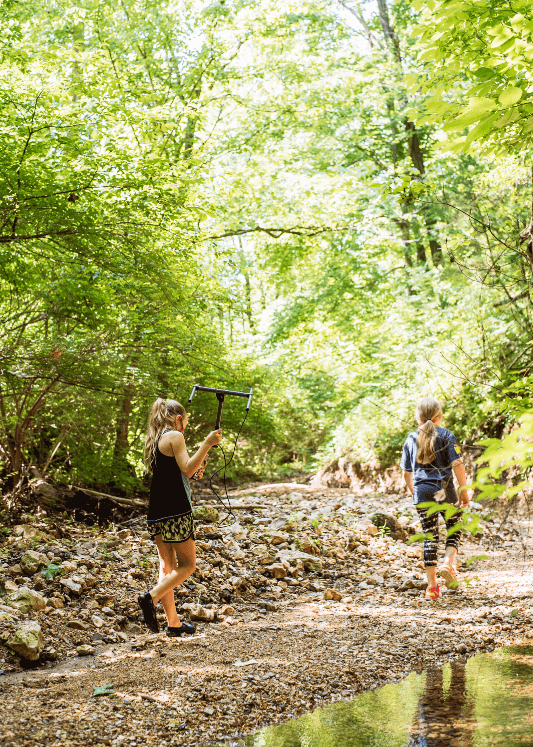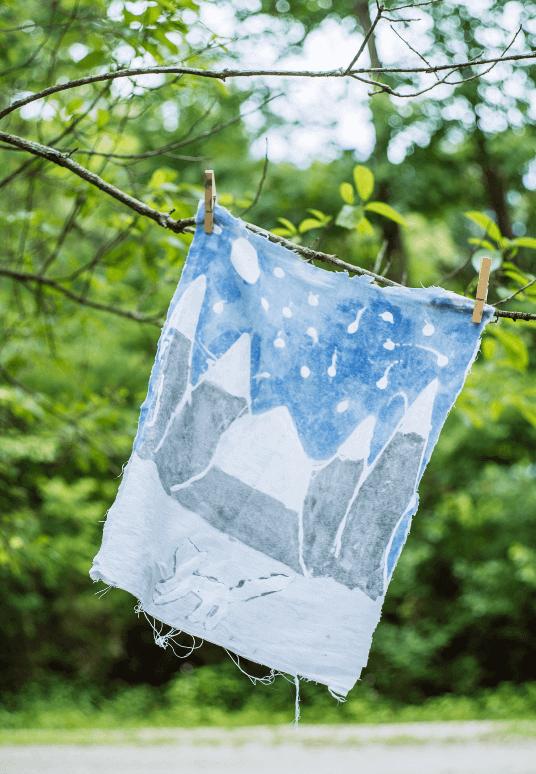Campers Connect with Nature in a Blended Program
Despite the ongoing and unconventional challenges of this summer, the Endangered Wolf Center continued to provide educational experiences to the community with our annual Summer Wolf Camp program. This year, campers chose from unique themes that highlight an element of natural history: art, science, and adventure. “Fairy Tails,” “Inspectors,” and “Explorers” gathered for one week both on-site and online with their Camp-in-a-Crates in tow!
Our summer camps aim to create lasting ties between our campers and nature. All weeks covered a wide range of topics with a focus on their chosen theme. The popular “Fairy Tails” placed an emphasis on art, while Teen Camp “BioMe” explored art, adventure and passion development. Teen campers even had the opportunity to make a positive difference in their local ecosystems by each constructing a bat box out of recycled wood.
Our staff used a blended program of online learning and in-person activities to give campers an unforgettable experience. Weekly activities included a keeper chat, hikes, and a full tour of our site where campers get to see many of our eight canid species. Sawyer (everyone’s favorite opossum) even stopped by to share his story.
Counselor “Tails” – Camp Counselor Jamie Shares Highlights of Wolf Camp
The first day of Summer Wolf Camp in 2020 just so happened to be the first Monday of the month, when tornado sirens are tested near the Endangered Wolf Center.
Picture this…
First, we hear the painted dogs squeak in response as they rattle the back corner of the fence. Their nails tap the ground excitedly. They seem giddy as they run back and forth from one end of their habitat to the next. Most of the campers have never seen anything like it. But what comes next puts them in awe.
As the tornado sirens continue to blare, Mack’s and Vera’s pack seem to think it’s a mechanical wolf. As they howl, two elderly wolves join in. The campers observe Flint in his habitat, unable to resist singing with the rest of the Mexican wolves. Though Flint is an old-timer, his howl is still strong and deep.
It’s a milestone for these animal enthusiasts. After all, it’s the first time most of these campers have ever heard wolves howl. This experience is like seeing your first rainbow or making your first wish on a shooting star. It’s a rare moment when nature is comfortable enough to surrender her secrets.
“I’m asking my parents to sign me up every year,” says one camper as she watches the American red wolf throw her head back in song.
One little girl writes down observations on her clipboard. Watching endangered animals in person is an experience that no cell phone or iPad can deliver. Seeing these beautiful creatures in a place where they can be themselves seems to make the kids feel at home.
The kids and the grown-ups have the same passion for wildlife conservation, which fosters a sense of hope for the future of our endangered species. Whether or not they become conservationists, these campers are full of passion.
Every year the campers evolve by the end of the week. The quietest campers drag their guardians by their hands to meet other campers’ parents and they exchange numbers. The kid who struggles to climb the nature-break hill is now navigating the creek all on his own. Even virtual activities bring out the best in these aspiring naturalists.

Outdoor settings like this beautiful creek allow for social distancing and plenty of space to explore.
By creating a blended camp program, campers got the best of both worlds – to play outside, spend time in nature, and bring the wild home with them with virtual education and activities about endangered animals.
Distance Learning During Summer Camp
Most Zoom calls begin with games of charades or campers announcing they have a special guest before angling the camera at their dog. Some kids even bring plush toys to keep them company during the zoom chats. Today the campers are meeting a special guest we have chosen based on the theme of the week – explorers week.
Kristen Schulte, educational director of the Missouri River Relief program, is spotlighted on our Zoom call.
“Since we’ve been doing this for the last 20 years, we’ve picked up 940 tons of trash,” she shares.
A camper in the top right of the screen drops her jaw, eyes wide in astonishment. But Kristen is just getting started.
“One of my favorite things we find in the river is…are you ready? Messages in a bottle.”
She’s arranged a variety of bottles on the table in front of her. Each decorated differently, sporting dents and battle scars from rough rides in the Missouri River. The kids take turns guessing what each message might say. Kristen gives them opportunities to look at the bottles and types of paper before reading each message. Some of these brittle pages are older than the kids themselves.
One letter from 2004 requests correspondence confirming somebody found the bottle. Little did they know it would be a river clean-up team. As we talk about the beauty of human connection through these types of messages, we ask the kids a big question that even grown-ups struggle to answer amid social distancing: “What are some ways to maintain a human connection while leaving no trace on our environment?” Some ideas include washable chalk messages on the driveway, putting up signs in windows, and leaving letters in library books for people to find.
Speaking of social distancing, you may be wondering how on earth we manage to entertain the kids without our usual interactive games. Some long-time camp parents may hear their camper relaying a game of “Tales,” or “Predators and Prey,” both of which involve tagging. This year we invented new games, including “Alpha May I,” a game to teach about telemetry.

Two young campers practice their telemetry skills using tools biologists use in the wild to track and protect wolves.
Telemetry is the method used by biologists to locate wolves in their natural habitat. To emulate this, we invite one camper to hide the radio collar while another holds up the radio receiver and listens very carefully for the tiniest beep. The closer the camper is to the transmitter in the collar, the louder the beep. After a camper triumphantly discovers the hidden collar, we wipe down the equipment with disinfectant and give another kiddo a turn. But it’s not just the younger kids having a lifetime experience at the Endangered Wolf Center.
This year Teen Camp gets some bonus opportunities, including a private wolf howl evening program and the chance to build take-home bat boxes. Though wolves are the stars of the EWC, we recognize the importance of every animal who calls our Center home. Early in the week, we had a Zoom chat with Bat Specialist Delainey O’Donnel. Delainey eagerly invited questions about these creatures who, like wolves, struggle with inaccurate media representation. Teen Camp enjoyed the freedom to work with power tools under counselor guidance.

Teen campers proudly show off their handmade bat boxes.
By Thursday, the night of the howling and second-to-last meeting of the week, Teen Camp had formed a family-like bond. Three of the campers sat in a circle, one to a bench while the other two worked with Camp Director Danna Hilleren to construct personal bat boxes. Each box came with easy-to-read tips and tricks for how to mount it properly. Some campers couldn’t manage to look away from the sky as they searched for nocturnal creatures.
As Zoom calls become the new normal and we continue to social distance, we believe our future generations must maintain a connection with nature. Camp this year managed to follow guidelines provided the CDC while building new friendships and memories that will shape curious minds.
A Unique, Successful Year of Summer Camp
A huge thank you goes out to all who made this blended summer camp program a huge success. We may have had a new format, but the end result was the same: educating and inspiring our campers to care about natural spaces.
Teaching the next generation about conservation is an important piece of our mission because we believe that education leads to an understanding and appreciation of the environment and the animals we share it with.
Thank you to the amazing guest speakers who joined us on Zoom to inspire our kids: children’s author Jeanine Ransom, environmental artist Hanna Fox, lab scientist & Astronomical Society member Katie Czeschin, River Relief Education Director Kristen Schulte, and Naturalist & Bat Specialist Delainey O’Donnel. These wonderful speakers gave amazing and engaging presentations and not only captured the kids’ imaginations but also inspired them to investigate the world they live in. Thank you to Backyard Trail Builds for donating the recycled wood that we used to build the bat boxes.
Thank you to our campers, their families, and our volunteers for their continued support of this innovative camp program!



